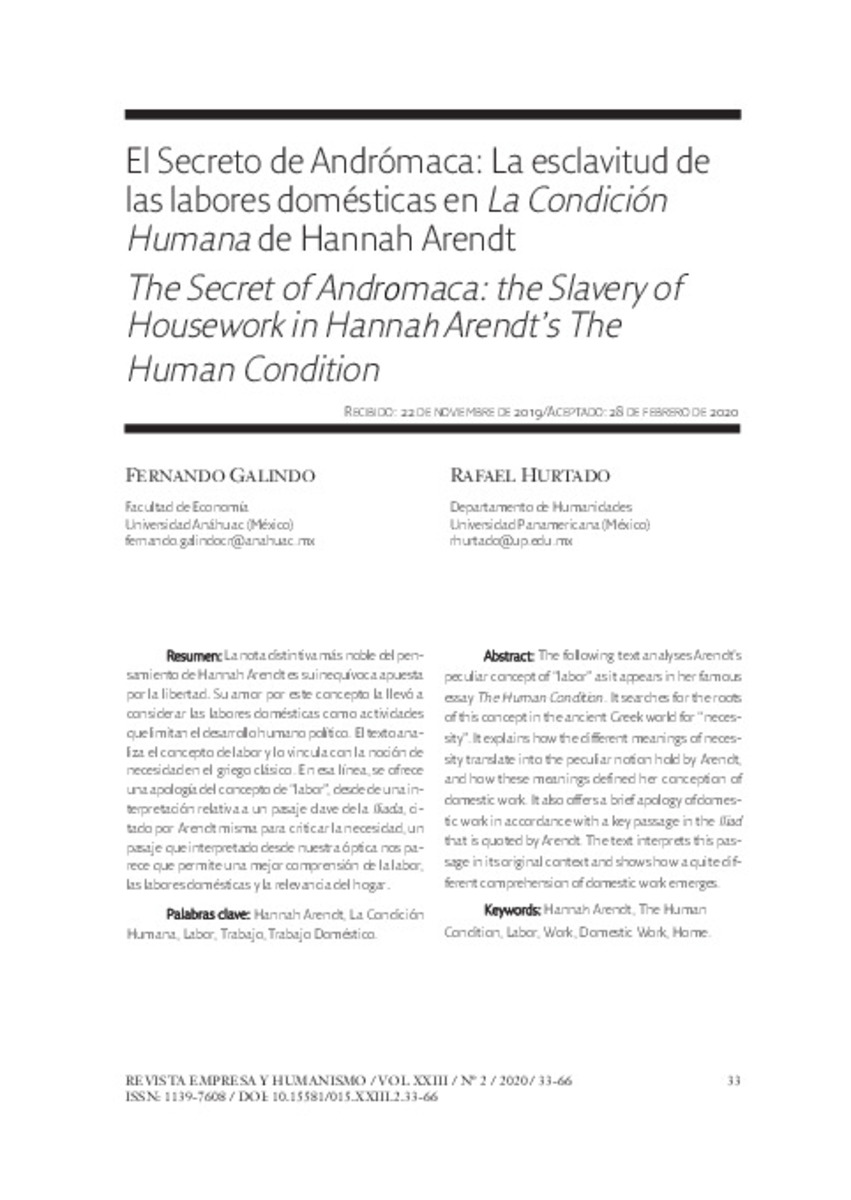Full metadata record
| DC Field | Value | Language |
|---|---|---|
| dc.creator | Galindo, F. (Fernando) | - |
| dc.creator | Hurtado, R. (Rafael) | - |
| dc.date.accessioned | 2020-07-16 | - |
| dc.date.accessioned | 2021-05-19T09:49:42Z | - |
| dc.date.available | 2021-05-19T09:49:42Z | - |
| dc.date.issued | 2020 | - |
| dc.identifier.citation | Galindo, F. (Fernando); Hurtado, R. (Rafael). "El Secreto de Andrómaca: La esclavitud de las labores domésticas en "La Condición Humana" de Hannah Arendt". Revista Empresa y Humanismo. XXIII (2), 2020, 33 - 66 | es |
| dc.identifier.issn | 1139-7608 | - |
| dc.identifier.uri | https://hdl.handle.net/10171/60510 | - |
| dc.description.abstract | The following text analyses Arendt’s peculiar concept of “labor” as it appears in her famous essay <em>The Human Condition</em>. It searches for the roots of this concept in the ancient Greek world for “necessity”. It explains how the different meanings of necessity translate into the peculiar notion hold by Arendt, and how these meanings defined her conception of domestic work. It also offers a brief apology of domestic work in accordance with a key passage in the <em>Iliad</em> that is quoted by Arendt. The text interprets this passage in its original context and shows how a quite different comprehension of domestic work emerges. | en_US |
| dc.description.abstract | La nota distintiva más noble del pensamiento de Hannah Arendt es su inequívoca apuesta por la libertad. Su amor por este concepto la llevó a considerar las labores domésticas como actividades que limitan el desarrollo humano político. El texto analiza el concepto de labor y lo vincula con la noción de necesidad en el griego clásico. En esa línea, se ofrece una apología del concepto de “labor”, desde de una interpretación relativa a un pasaje clave de la<em> Iliada</em>, citado por Arendt misma para criticar la necesidad, un pasaje que interpretado desde nuestra óptica nos parece que permite una mejor comprensión de la labor, las labores domésticas y la relevancia del hogar. | es_ES |
| dc.language.iso | spa | - |
| dc.publisher | Servicio de Publicaciones de la Universidad de Navarra | es_ES |
| dc.rights | info:eu-repo/semantics/openAccess | es_ES |
| dc.subject | Hannah Arendt | - |
| dc.subject | La Condición Humana | - |
| dc.subject | Labor | - |
| dc.subject | Trabajo | - |
| dc.subject | Trabajo Doméstico | - |
| dc.title | El Secreto de Andrómaca: La esclavitud de las labores domésticas en "La Condición Humana" de Hannah Arendt | es_ES |
| dc.title.alternative | The Secret of Andromaca: the Slavery of Housework in Hanna Arendt’s The Human Condition | en_US |
| dc.type | info:eu-repo/semantics/article | es_ES |
| dc.identifier.doi | 10.15581/015.XXIII.2.33-66 | - |
| dadun.citation.endingPage | 66 | - |
| dadun.citation.number | 2 | - |
| dadun.citation.publicationName | Revista Empresa y Humanismo | - |
| dadun.citation.startingPage | 33 | - |
| dadun.citation.volume | XXIII | - |
Files in This Item:
Statistics and impact
Items in Dadun are protected by copyright, with all rights reserved, unless otherwise indicated.






